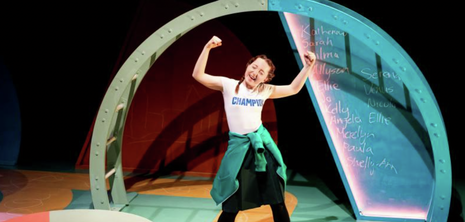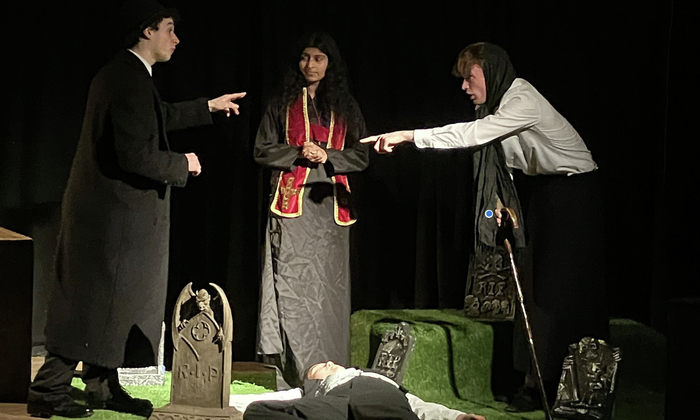Protest: a family-friendly manifesto for happiness
Playground politics collide with urgent social commentary as Protest explores societal injustice through the lenses of three spirited schoolgirls

Stepping into the world of Protest at the Arts Theatre felt like a nostalgic journey back to primary school days, albeit with a slightly corporate twist. Surrounded by rambunctious primary schoolers, weary-eyed trailing parents, and an overpolished crayola-coloured climbing frame set, we had little doubt that we would need our complimentary glasses of wine.
In just an hour (though it occasionally felt longer) three young girls – Jade, Alice and Chloe – navigate the injustices of the world, offering an ode to girlhood. The play, written by Hannah Lavery and directed by Natalie Ibu, is a multi-layered exploration of childhood innocence and the power of individual and collective action, set within the confines of a primary school playground. Through a series of vignettes and monologues, Lavery explores the intersecting lives of the three girls, each grappling with their unique challenges and aspirations. The plot reconciles playful exuberance and poignant emotional depth. From Alice’s frustration at being sidelined in sports competitions, to Jade’s encounters with racial prejudice, and Chloe’s angst over the fate of the planet, Protest offers a enigmatic portrayal of youthful resilience in the face of adversity for its target audience of eight to thirteen year olds.
"Protest offers a enigmatic portrayal of youthful resilience in the face of adversity."
This trio of protagonists were brought to life with remarkable authenticity by Kirsty Maclaren, Harmony Rose-Bremner, and Amy Murphy, with one of us even asking while leaving the theatre, “were they actually kids?!” (They were not, convincing as they were). Each character was played with unbridled energy and enthusiasm that evoked a palpable sense of child-like glee. MacLaren’s portrayal of Alice, a spirited sports enthusiast vexed by gender stereotypes of boys running faster than girls, was brimming with infectious determination. Meanwhile Murphy, in her role as Chloe, exuded a quiet yet profound strength, finding solace in nature while grappling with the existential threat of climate change. Rose-Bremner truly embodied the resilience of Jade, one of the few black girls in her class, as she confronts the insidious and conspicuous forces of racism that pervade her everyday life. The acting was truly the chef d’oeuvre of this production.
Yet such a theatrical masterclass did not detract from the looming issues of a script which was ultimately spread too thin. It appeared like ten Jacqueline Wilson novels crammed into one - tokenizing issues to the extent that one of us remarked that there should be a cash register sound every time a new injustice was capitalised upon. Admittedly, broad sweeps across social issues are important for capturing a younger audience, and credit must be given to the budding intersectionality in the production. Yet, when looking at the play as a whole, breadth instead of depth makes little sense in the loaded events and phrases which were utilised. “Greenham Common” or “Friends of the Empire” were not unpacked and quickly invalidated by quips on break time dynamics or chalk drawings. While sharp, overly repeated cries of “I am a girl” somewhat reinforced gender binaries at the beginning and end of the play, which in a time of dominant Conservative Party hostility against gender fluidity seemed dated.
"Each character was played with unbridled energy and enthusiasm that evoked a palpable sense of child-like glee"
The ultimate tokenization came in the form of a singular reference to the LGBTQ+ Pride flag painted in glitter across the cheeks of Chloe’s brother. This form of inclusion is undoubtedly a positive movement, and yet this one-line aside, in the context of a play about marginalisation, seemed to be more of a flyaway comment than a moment of genuine acceptance. Its surface level broadcasting not only undermined the complexity and nuance of LGBTQ+ issues, but simply left the audience confused. The brother whom the audience thought was depressed on account of his fresh move into adolescence and loss of a father figure, could now be reread in the context of his sexuality. Breadth and not depth is the party line of this production.
"It is an undoubtedly novel and much needed endeavour"
An underwhelming ending encompassed such shallow asides as the town’s ‘protest’, a utopian moment of triumph for its protagonists, ultimately fell flat. Actors, whose stunning performances remained constant, nevertheless failed to muster the audience enthusiasm necessary for families and children to stand up and wave their protesting placards. Staring dimly down at our “take up space” cardboard cutout (which you can keep, by the way) we couldn’t help but feel slightly cynical in a vastly empty auditorium. The scene, and production at large, can really only be summed up by our sitting down and the sinking feeling that this fairytale portrayal of grassroots activism lacks grit.
“It’s a good start”, one of the most quintessential lines of this production, concludes our view of Protest in the most infuriating way. It is an undoubtedly novel and much needed endeavour. The necessity of educating children on social issues in a holistic and entertaining manner is admirable and as adults it serves to remind us that ‘protest’ can come in everyday forms, as educational theatre itself testifies to. We are sure Protest sparked conversations in the households of those children who attended, and we are glad for it, even if we were left questioning if this particular ‘conversation’ was really enough.
Protest is showing at the Cambridge Arts Theatre until Thursday 22nd of February.
 News / Judge Business School advisor resigns over Epstein and Andrew links18 February 2026
News / Judge Business School advisor resigns over Epstein and Andrew links18 February 2026 News / Gov grants £36m to Cambridge supercomputer17 February 2026
News / Gov grants £36m to Cambridge supercomputer17 February 2026 News / CUCA members attend Reform rally in London20 February 2026
News / CUCA members attend Reform rally in London20 February 2026 News / Union speakers condemn ‘hateful’ Katie Hopkins speech14 February 2026
News / Union speakers condemn ‘hateful’ Katie Hopkins speech14 February 2026 News / Hundreds of Cambridge academics demand vote on fate of vet course20 February 2026
News / Hundreds of Cambridge academics demand vote on fate of vet course20 February 2026










